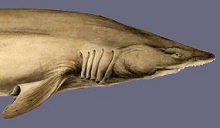World record tagged shark recapture
Media Release
Department of Fisheries, Western Australia
21. March 2018
— — — — — — — — — — —
 A recreational fisher has caught and released a grey nurse shark that was tagged by Fisheries scientists east of Esperance 23 years ago.
A recreational fisher has caught and released a grey nurse shark that was tagged by Fisheries scientists east of Esperance 23 years ago.
This is believed to be a world record for the longest time a tagged grey nurse shark has been ‘at liberty’ before being recaptured. It has also helped scientists verify the species’ rate of growth based on size and estimated age – important information for managing the grey nurse shark population.
The fisher caught the 2.5-metre shark on New Year’s Day at a remote location near Esperance and spotted the tag in the fish’s flank. All grey nurse sharks are totally protected from fishing in WA, and, having quickly taken the details from the tag, the fisher carefully released the shark and later contacted us to report the capture.
The tag was an old design used a number of years ago by our scientists, who attached the 6cm tags in the tough flank muscles of sharks. Due to the age of the tag, we had to delve back in the archives to find the record of the shark’s original capture and release. It was originally caught on 11 November 1995, 365 kilometres from where it was later recaptured and, at the time, was estimated to be four years old, measuring nearly 1.9 metres long.
This means the shark was 27 years old at the time of its latest capture, confirming a method international shark scientists have been developing to determine the rate of growth of grey nurse sharks – a formula based on the length of the shark and its estimated age determined by the number of growth bands in its vertebrae.
As sharks don’t have otoliths (ear bones), they can’t be aged in the same way as scalefish. Being able to accurately gauge the age of sharks assists scientists in assessing the status of their populations and in turn provides a basis for their sustainable management, a bonus outcome of this particular shark’s recapture.
The presence of many species of shark as ‘apex predators’ – occupying the top level of the food chain – is an indication of a healthy marine environment, so monitoring their stocks is important, and assists commercially-fished sharks to be sustainably managed.
Sharks can travel thousands of kilometres and tagging them provides a wealth of important information about their movements, growth and breeding habits. Over the years, our scientists have tagged and released more than 10,000 sharks comprising a wide variety of species, including white sharks with acoustic tags.
If you catch any species with one of our tags, report its size; tag number; date, time and location of capture; and your details either by phoning (08) 9203 0111 or using our FishTagWA app. Ensure that any protected species of shark are immediately and carefully released back to the water with the least possible injury.
Source: Government of Western Australia

Nice tag-recap data and always a great find considering the rarity of returns after even just a short time period. This post leads me to mention that other species have been recaptured after similar periods of time at liberty. Our work on sandbar shark in NE Atlantic provided some returns after nearly 30 years (27.8 years). These age-at-length data were in agreement with estimates we derived from bomb radiocarbon dating for a longevity near 40 years, at least (publication PDF to you if you’d like a copy). Cheers! Allen